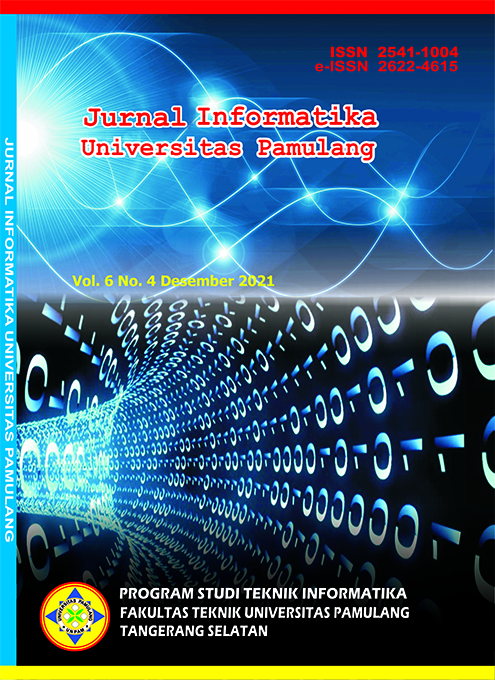Implementasi Teori Naive Bayes dalam Klasifikasi Ujaran Kebencian di Facebook
DOI:
https://doi.org/10.32493/informatika.v6i4.12593Keywords:
Hate Speech Classification, Naïve BayesAbstract
Hate Speech can be orally or in writing which is expressed intentionally by someone for the purpose of spreading and leading to hatred between groups of people. The phenomenon of Hate Speech has become a hot topic. This is motivated by netizens who often express Hate Speech either in the comments column or in their personal status on social media. The impact of this phenomenon is the emergence of hatred in society which can lead to conflict. The purpose of this study is to implement the Naïve Bayes Theory in the classification of Hate Speech on Facebook. In this study Naïve Bayes is used as a Classfifier. Naïve Bayes method is applied to find the probability of words in documents would be categorized as hate speech or not hate speach. This Classfifier is implemented using Python programming language. In the Classfifier design stage, 500 data are collected randomly on Facebook. Data is divided by 80% - 20% , 400 text data for training and 100 text data for testing. The accuracy for hate speech classification in this study is 83%. These results are obtained from Classfifier evaluations using test data where the Classfifier correctly labels 83 out of 100 test data.
References
Ahmad, M., Octaviansyah, M. F., & Kardiana, A. (2019). Sentiment Analysis System of Indoneisan Tweets using Lexicon and Naive Bayes Approach. 2019 Fourth International Conference on Informatics and Computing (ICIC), 7–11.
Akella, J. O., & Akella, L. N. Y. (2018). Sentiment Analysis Using Naïve Bayes Algorithm: With Case Study. Proceedings of the 3rd International Conference on Inventive Computation Technologies, ICICT 2018. https://doi.org/10.1109/ICICT43934.2018.9034394
Bird, S., Loper, E., & Klein, E. (2009). Natural Language Processing with Python. O’Reilly Media, Inc.
Cortis, K., & Davis, B. (2021). Over a decade of social opinion mining: a systematic review. Artificial Intelligence Review, 54(7), 4873–4965. https://doi.org/10.1007/s10462-021-10030-2
Elouardighi, A., Maghfour, M., & Hammia, H. (2017). Collecting and processing arabic facebook comments for sentiment analysis. International Conference on Model and Data Engineering, 262–274.
Fanissa, S., Fauzi, M. A., & Adinugroho, S. (2018). Analisis Sentimen Pariwisata di Kota Malang Menggunakan Metode Naive Bayes dan Seleksi Fitur Query Expansion Ranking. Jurnal Pengembangan Teknologi Informasi Dan Ilmu Komputer, 2(8), 2766–2770.
Khoo, C. S., & Johnkhan, S. B. (2018). Lexicon-based sentiment analysis: Comparative evaluation of six sentiment lexicons. Journal of Information Science, 44(4), 491–511. https://doi.org/10.1177/0165551517703514
Ligthart, A., Catal, C., & Tekinerdogan, B. (2021). Systematic reviews in sentiment analysis: a tertiary study. Artificial Intelligence Review, 54(6). https://doi.org/10.1007/s10462-021-09973-3
Rahmad, A. N., & Pribadi, F. S. (2015). Pemilihan Feature Dengan Chi Square Dalam Algoritma Naïve Bayes Untuk Klasifikasi Berita. Edu Komputika Journal, 2(1), 13–21. https://doi.org/10.15294/edukomputika.v2i1.7823
Robbani, H. A. (2016). PySastrawi (1.2). https://github.com/har07/PySastrawi
Suryono, S., & Taufiq Luthfi, E. (2018). Analisis sentimen pada Twitter dengan menggunakan metode Naïve Bayes Classifier. Seminar Nasional Geotik, 9–15. https://doi.org/10.36802/jnanaloka.2020.v1-no2-81-86
Downloads
Published
Issue
Section
License
Authors who publish with this journal agree to the following terms:
- Authors retain copyright and grant the journal right of first publication with the work simultaneously licensed under a Creative Commons Attribution-NonCommercial 4.0 International (CC BY-NC 4.0) that allows others to share the work with an acknowledgement of the work's authorship and initial publication in this journal.
- Authors are able to enter into separate, additional contractual arrangements for the non-exclusive distribution of the journal's published version of the work (e.g., post it to an institutional repository or publish it in a book), with an acknowledgement of its initial publication in this journal.
- Authors are permitted and encouraged to post their work online (e.g., in institutional repositories or on their website) prior to and during the submission process, as it can lead to productive exchanges, as well as earlier and greater citation of published work (See The Effect of Open Access).
Jurnal Informatika Universitas Pamulang have CC-BY-NC or an equivalent license as the optimal license for the publication, distribution, use, and reuse of scholarly work.
In developing strategy and setting priorities, Jurnal Informatika Universitas Pamulang recognize that free access is better than priced access, libre access is better than free access, and libre under CC-BY-NC or the equivalent is better than libre under more restrictive open licenses. We should achieve what we can when we can. We should not delay achieving free in order to achieve libre, and we should not stop with free when we can achieve libre.
Jurnal Informatika Universitas Pamulang is licensed under a Creative Commons Attribution-NonCommercial 4.0 International (CC BY-NC 4.0)
YOU ARE FREE TO:
- Share : copy and redistribute the material in any medium or format
- Adapt : remix, transform, and build upon the material for any purpose, even commercially.
- The licensor cannot revoke these freedoms as long as you follow the license terms





